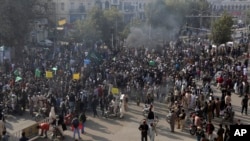Pakistan’s government has called in the army to deal with thousands of protesters in the capital, Islamabad after a security crackdown led to violent clashes. More than 100 security personnel and several dozen protesters have been injured, according to local hospital sources.
The operation started about 7 a.m. local time Saturday after the protesters were given a deadline to peacefully disperse and they ignored it.
Several Islamist groups had been carrying out a sit-in for the past 20 days demanding that the federal law minister resign after a minor amendment in an electoral oath, which the protesters insisted undermined their religious beliefs. The government said the amendment was a clerical error and had been reversed.
The sit-in has paralyzed life in the capital city, and at least two people, including a child, have died over the last three weeks when their ambulances could not reach hospitals in time. The protesters also defied court orders to disband.
Once the operation started, the protests quickly spread to other cities, and by Saturday afternoon, Pakistan’s largest cities Lahore and Karachi, also experienced clashes between police and supporters of the Islamist parties.
Several main entrances to Lahore were blocked by protesters, while several major highways in different parts of the country also were cut off by groups of protesters who set fire to tires.
By early afternoon, the government shut down all the news channels and blocked access to social media sites Facebook, Twitter, and YouTube to try to contain the fallout.
Pakistan Interior Minister Ahsan Iqbal said his government was ready to negotiate with the protesters and would try to minimize losses during the operation. The government had resisted carrying out the operation, indicating some among the protesters carried weapons, and the fallout could spread across the country. It was forced, however, after a court ordered that the area be cleared.
More than 8,000 security personnel took part in the initial operation Saturday morning. Police used tear gas, water canons, and riot gear. The protesters set fire to several vehicles. The operation was suspended before the decision to call in the army.




